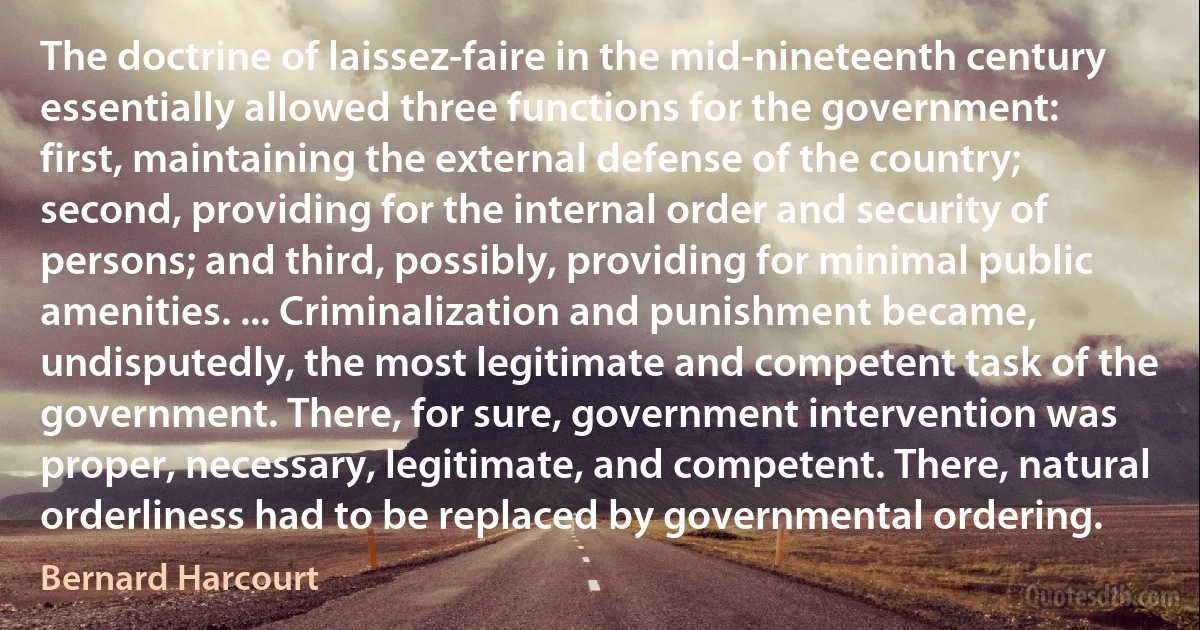
The doctrine of laissez-faire in the mid-nineteenth century essentially allowed three functions for the government: first, maintaining the external defense of the country; second, providing for the internal order and security of persons; and third, possibly, providing for minimal public amenities. ... Criminalization and punishment became, undisputedly, the most legitimate and competent task of the government. There, for sure, government intervention was proper, necessary, legitimate, and competent. There, natural orderliness had to be replaced by governmental ordering.
Bernard HarcourtRelated topics
amenities century country doctrine government intervention maintaining natural necessary order orderliness proper public punishment second security sure task third three laissez-faireRelated quotes
Mr. Chamberlain's Budget was the natural expression of the character of the present Government. There was hardly any increase allowed for the services which went to build up the life of the people, education and health. Everything was devoted to piling up the instruments of death. The Chancellor expressed great regret that he should have to spend so much on armaments, but said that it was absolutely necessary and was due only to the actions of other nations. One would think to listen to him that the Government had no responsibility for the state of world affairs.

Clement Attlee
I am sorry... to have occasion to admonish Mr. Gibbon, that he should have distinguished better than he has done between christianity itself, and the corruptions of it. ...He should not have taken it for granted, that the doctrine of three persons in one God, or the doctrine of atonement for the sins of all mankind, by the death of one man, were any parts of the christian system; when, if he had read the New Testament for himself, he must have seen the doctrine of the proper unity of God, and also that of his free mercy to the penitent, in almost every page of it.

Joseph Priestley
By three things man standeth in this life; by which three God is worshipped, and we be speeded, kept and saved.
The first is, use of man's Reason natural; the second is, common teaching of Holy Church; the third is, inward gracious working of the Holy Ghost. And these three be all of one God: God is the ground of our natural reason; and God, the teaching of Holy Church; and God is the Holy Ghost. And all be sundry gifts to which He willeth that we have great regard, and attend us thereto. For these work in us continually all together; and these be great things.

Julian of Norwich
But it is recognized that punishment for the abuse of the liberty accorded to the press is essential to the protection of the public, and that the common law rules that subject the libeler to responsibility for the public offense, as well as for the private injury, are not abolished by the protection extended in our constitutions. The law of criminal libel rests upon that secure foundation. There is also the conceded authority of courts to punish for contempt when publications directly tend to prevent the proper discharge of judicial functions.

Charles Evans Hughes
Yet we slink about like whipped curs ... our self-abasement principally takes the form of subservience to the United States ... we are under no necessity to participate in the American nightmare of a Soviet monster barely held at bay in all quarters of the globe by an inconceivable nuclear armament and by political intervention everywhere from Poland to Cambodia. It is the Americans who need us in order to act out their crazy scenario... We simply do not need to go chasing up and down after the vagaries of the next ignoramus to become President of the United States.

Enoch Powell
